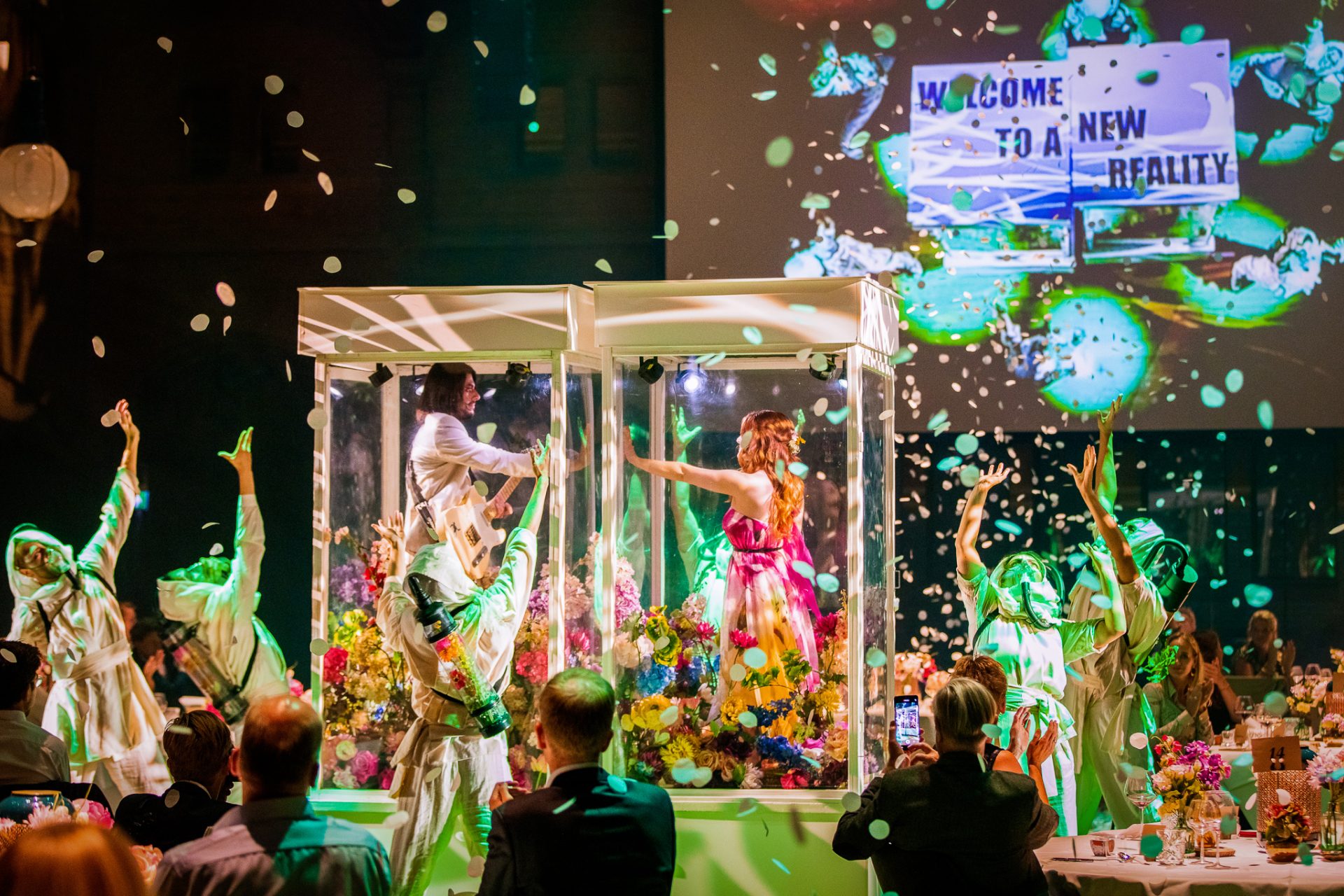New showpage: Celebrating 125 years
We are very proud to announce our newest show page of a large anniversary theatre show. For this live experience, we turned a theatre in Amsterdam upside down.
Nowadays, we find ourselves in a similar situation as Shakespeare was during the plague pandemic of 1606. Yet, that did not stop him from creating a world-famous theatre play. Let’s get inspired, unleash our creative minds and reinvent live experiences.

The global pandemic of Covid-19 is without a doubt on every event professional’s mind. Whether in mere traces of initial worries or in concrete and present fears. Since fear is the downfall of creativity and everything I hold so very dear, I would like to take away some of those worries and replace them with possibilities instead. I would like to share my thoughts on the current situation and my vision on the foreseeable future of events.
A few weeks ago, we performed our first show sequence since Corona hit us, in the beautiful Beurs van Berlage, Amsterdam. I took the stage to share my insights and ideas on the current society and events within the “new normal”. Please have a look at the video below or read on to find out more about our vision and the thought process behind it.
During the plague pandemic of 1606, when entire communities were confined to their homes, Shakespeare wrote a theatre play. He created a piece of work that wasn’t reliant on his situation. Moreover, the play was not simply “okay”, a compromise born from circumstance, but well-thought-out in its essence. That play, “King Lear”, went on to become world-famous and to be performed for centuries to come.

Nowadays, we find ourselves in a similar situation as Shakespeare was. Yet, we might believe that our current situation makes it impossible to create beautiful events. Some even believe compromise to be the best-case-scenario. I believe that this happens when we fixate on the COVID-19 situation instead of the goal we are trying to achieve. We start thinking about problems and fixes, without considering whether we’re addressing the core need of that event or show.
Filming an event for online purposes offers a solution to avoiding close proximity, but this is a tool rather than an all-encompassing solution. It doesn’t say anything about the essence of the show yet. We prioritise the format over the message. In the process, we fail to cater to our audience’s desire for immersive experiences.

In order to understand the current needs and desires of our audience, my team and I got inspired by the theory of Society 3.0, which defines three phases of audience communication:
When we simply broadcast an event to our audiences, we essentially revert back to a Society 1.0 mentality.
“We need to stop thinking about
20th-century solutions for a
21st-century reality.”
While today’s changed environment doesn’t allow us to operate in autopilot, we shouldn’t forget that we don’t need the autopilot. We are masters of our craft, are we not? Therefore, let’s re-examine our accumulated knowledge and experience. After some intense scrutiny, we found that we only really need to address to a few core principles to enlarge virtual, digital or hybrid success:
While these four are relevant in both live as online events, the digital environment of Society 3.0 requires us to create content that demands their focus, is immersive and exciting, allows and encourages their participation, and most of all, diminishes the temptations to click to another page or simply turn their attention to the cat on the table.
So, let’s use our creative brains and fiery passion to come up with better solutions; ones that make us love what we do and inspire others, but also addresses the needs and desires of our audiences. The notion that something is impossible is not yet enough to stop us from seeing possibilities.

An example of such a possibility would be to reimagine the format of the TV show “Who wants to be a millionaire?”, or its Dutch counterpart “Weekend Miljonairs”. Imagine adding elements of the show to a live stream. For example, during an interview, the CEO is asked about whether it’s appropriate to return to the office again. The CEO can either answer on the spot, or ask for the audience to vote on the matter via the famous “Helplines”. By pairing a classic format with personal interaction, we create a participatory experience that integrates all four core principles.
“The notion that something is impossible is not yet enough to stop us from seeing possibilities.”
There is so much left that we haven’t yet tried. So many possibilities that we can ponder on. Let’s channel our inner Shakespeare, unleash our creative minds and reinvent live experiences. Are you as excited as we are? We would love to hear your thoughts and ideas!